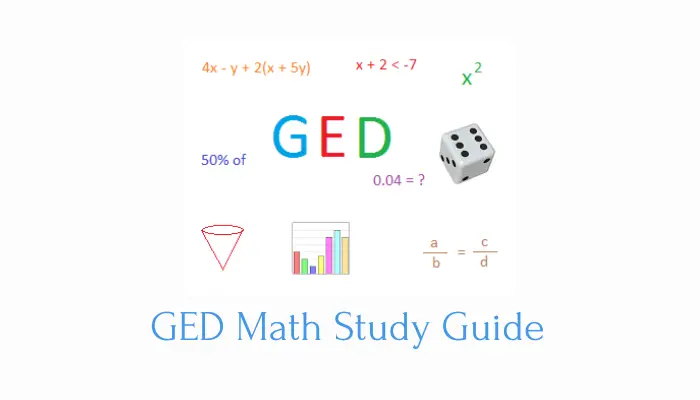As GED math curriculum is always changing, a lot of people find the math part of the GED test really hard. It’s really important for test-takers to have the most recent and complete study materials. That’s why many people use study guides to help them get ready for the test.
This article will serve as a guide for those looking to take the GED math test in 2023. It will provide the key concepts and strategies necessary to excel in the math section of the GED test.
2023 GED Math Curriculum Changes :
- Real-world problem solving focus
- Integration of technology in math concepts
- Increased emphasis on financial literacy
- Introduction of data analysis and statistics
- Incorporation of geometry and measurement skills
- Use of real-life scenarios in math questions
Key Concepts and Formulas to Remember
In order to excel on the GED math exam, it is essential to have a firm grasp of key mathematical concepts and formulas.
Some Important Concepts :
- Master Arithmetic Operations: Understand addition, subtraction, multiplication, and division, and apply them to solve word problems effectively.
- Comprehend Fractions, Decimals, and Percentages: Grasp the concepts and learn how to convert between fractions, decimals, and percentages.
- Basic Geometric Principles: Familiarize yourself with properties of triangles, circles, and polygons to solve geometry problems.
- Algebraic Mastery: Learn to solve equations, inequalities, and work with variables for algebraic problem-solving.
- Remember Formulas: Memorize key formulas like area, perimeter of shapes, the Pythagorean theorem, and the quadratic formula for efficient problem-solving in the GED math exam.
Important Math Formulas :
- Pythagorean theorem: a² + b² = c²
- Order of operations: PEMDAS (Parentheses, Exponents, Multiplication, Division, Addition, Subtraction)
- Area of a rectangle: length x width
- Slope: rise/run
- Percentages: part/whole x 100
- Volume of a cube: side length³
List of Topics that Appear on the GED Math Test
- Algebraic expressions and equations
- Measurement and data analysis
- Geometry concepts and constructions
- Functions and linear equations
- Proportions and percentages
- Probability and statistics
- word problems
Strategies for Solving Word Problems
Break Into Steps: Divide the problem into smaller, manageable steps to enhance clarity.
Visualize with Diagrams: Create diagrams or charts to visualize the problem and organize information effectively.
Translate into Equations: Convert problem words into math equations or inequalities and solve for the unknown variable.
Check and Verify: Ensure the answer aligns with the problem’s context; verify its accuracy and relevance.
Practice Regularly: By employing these strategies, students can improve their proficiency in solving word problems effectively.
Tips for Mastering Algebraic Equations
To master algebraic equations, it is important to have a solid understanding of the fundamental principles and techniques.
Here are some tips for solving GED math tests algebraic equations:
- Understand the Basics of Algebra: Before you can start solving equations, you need to have a strong foundation in the basics of algebra. This includes understanding concepts like variables, coefficients, and exponents.
- Identify the Variable: The variable is the unknown quantity that you are trying to solve for. It is usually represented by a letter, such as x, y, or z.
- Isolate the Variable: To isolate the variable, you need to manipulate the equation so that the variable is by itself on one side of the equation. This can be done by adding, subtracting, multiplying, or dividing both sides of the equation by the same number.
- Simplify the Equation: Once the variable is isolated, you can simplify the equation by combining like terms. For example, 2x + 3 + 4x = 6x + 3.
- Solve for the Variable: To solve for the variable, divide both sides of the equation by the coefficient of the variable. For example, if 6x = 18, then x = 3.
Here are some additional tips for solving GED math tests algebraic equations:
- Use the distributive property to multiply expressions. For example, 2(x + 3) = 2x + 6.
- Use the order of operations to simplify expressions. For example, 2 + 3 x 4 = 2 + 12 = 14.
- Use a calculator to check your work.
Understanding Data and Statistics
Understanding data and statistics involves a range of skills, including the ability to identify and collect relevant data, analyze it using appropriate statistical methods, and draw accurate and meaningful conclusions.
It also requires a solid understanding of concepts such as probability, sampling techniques, and statistical inference.
By developing proficiency in these areas, students can navigate the vast amount of information available and make sound judgments and predictions based on data-driven evidence.
Navigating Geometry and Measurements
Navigating the intricacies of geometry and measurements requires a solid understanding of fundamental concepts and principles.
Geometry encompasses the study of shapes, angles, lines, and their properties.
While measurements involve quantifying physical attributes such as length, area, volume, and angles.
Mastery of these topics involves :
-Recognizing geometric shapes,
-Understanding their properties
-Applying appropriate formulas and techniques to solve problems.
Additionally, being able to accurately measure and interpret data using appropriate units and tools is essential.
Interpreting Graphs and Charts Accurately
Graphs and charts show information in a visual way, which makes it easier to understand complicated data. They can show trends, patterns, and connections between different things in a clear and attractive way.
But in order to get useful information from these visuals, it’s crucial to know about the different parts of graphs and charts, like the axes, labels, legends, and scales.
By getting good at interpreting graphs and charts, people can handle lots of information, make smart choices, and explain their findings to others effectively.
GED Calculator Lessons
It’s highly recommended that you become familiar with the TI-30XS calculator. Knowing how to solve basic problems and even some more complex equations can help you earn extra points.
GED Math Test Tips
- Familiarize yourself with the calculator provided on the test.
- Understand and practice problems from algebra, geometry, and basic arithmetic topics.
- Review probability, statistics, and data analysis concepts.
- Develop robust problem-solving skills.
- Speed is important but accuracy is key; avoid rush mistakes.
- Refresh your understanding of mathematical notations used in the test.
- Practice plenty of past GED Math exam questions for familiarity.
- Don’t waste too much time on difficult questions; move on and come back later if possible.
- Use your scrap paper for calculations and note-taking to help clarity and accuracy.
- Rest well before the exam day to ensure optimal mental performance during the test.
FAQ
Is the GED math Test Hard?
The difficulty of the GED math test varies from person to person. For some individuals, the math test may be challenging, especially if they have not studied or practiced math concepts in a while. However, with proper preparation and study, many find the GED math test manageable.
How Many Questions Can I Miss on the GED Math Test?
The number of questions that you can miss on the GED Math test depends on the total number of questions on the test and the passing score. The GED Math test has 46 questions, and you need to earn a minimum of 145 points to pass. The scoring is based on a scale of 100-200, with 145 being the passing score. Therefore, you can miss a maximum of 46 – (145-100) = 1 question and still pass the GED Math test.
How long is the math GED test?
The math GED test typically takes around 90 minutes to complete.
How many times can you fail the GED Test?
There is no limit to the number of times you can attempt the GED test. You can retake any or all of the sections as many times as needed until you pass. However, there may be waiting periods between retakes and certain fees associated with each attempt. It is recommended to adequately prepare and study before each attempt to increase the chances of passing.



